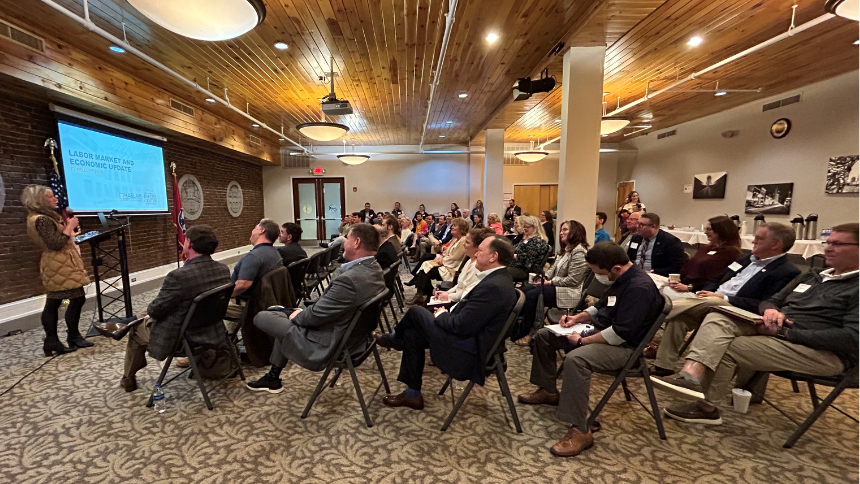
Here’s what’s up with Tennessee’s economy
When it comes to the workforce, job availability, and growth of the Volunteer State, overall the economy is in a pretty good place, but there's always room for improvement. Let's break it down.
Will there be a recession? Why is inflation so high? Is Tennessee’s economy doing okay?
Those are questions circulating around as people can’t help but notice things like the high price of eggs or elevated mortgage rates.
The economy isn’t easy to understand, so one local economist helped break it down at a Knoxville Chamber event this past week.
Dr. Marianne Wanamaker is the Executive Director of the Howard H. Baker Jr. Center for Public Policy at the University of Tennessee, Knoxville. It’s soon to be the School of Public Policy if all necessary steps are approved.
An economist and economics professor by trade, Wanamaker broke down the state of the economy on a national and statewide level, from the good to the bad.
Wanamaker started by showing how the U.S. is bouncing back from the COVID pandemic when it comes to gross domestic product, which is much better than most countries on an international level.
“Where we actually are is where effectively we would have been if COVID never happened,” she said. “Any way you look at it we’re in a good spot.”
From an unemployment perspective, the U.S. is also in an unprecedently good spot.”
“Before 2019 there were always more unemployed people than open jobs,” said Wanamaker. “Now the number of open jobs is two times the number of people looking for jobs. We’ve not been in this situation in recent memory.”
With more jobs than people to fill them, companies are starting to offer more money to get people to come to or stay at those jobs. Wanamaker explains that’s leading to wage inflation, which is part of what’s adding to general inflation.
In the south, the labor shortage is much worse than in other parts of the country, meaning there are even more jobs and even fewer people to fill them.
“It’s not about public generosity,” said Wanamaker. “Unemployment benefits in Georgia, South Carolina, and Tennessee are among the lowest in the country.” She explains that health, disabilities, and to some extent education are to blame.
Overall the U.S. is about 3 million workers short. Wanamaker explains that’s not just a workforce problem, but a population growth problem. In 2022, the U.S. population only grew about 0.3 percent. Usually, it’s around 1 percent.
“If you want your economy to grow at 2.5 percent and the population grows by 1 percent, where is the other 1.5 percent coming from?” asked Wanamaker. “Productivity. How much is each worker producing?” Increasing productivity to account for almost no population growth isn’t possible to achieve that same percent growth.
“Economic growth is what runs public budgets,” said Wanamaker. “Every choice you make, you’re thinking, “how do I do the things I did before with a 2 percent smaller budget?”
This slow in population growth is attributed to lower birth rates, lower immigration rates, and more deaths among a larger aging population.
As a result, one-third of U.S. states are shrinking. Tennessee is growing, albeit not as fast as other parts of the country. Tennessee had more deaths than births in 2021, but a lot more people are moving here from other states. Wanamaker said from a budgetary perspective, that means Tennessee won’t have to make tough cuts stemming from a shrinking population.
So when it comes to a recession, will there be one?
Historically when the fed raises inflation rates and then drops them, the answer is yes. Based on past data, a recession occurs within a year after high rates are dropped.
That’s been hard to avoid in the past, but Wanamaker has a theory that it could be avoided this time around. The biggest difference now is that we have more jobs open than people to fill them.
Past recessions usually lead to job cuts, and admittedly we have been seeing thousands of workers cut from the tech industry this year. Wanamaker said the difference this time, is there are still more than enough openings going around for those people to find new jobs in different sectors.
As far as Tennessee workers go, “there’s cause for concern in what’s going on with our workforce,” Wanamaker said.
College enrollment rates have fallen, and Tennessee remains “well behind the national average in college attainment,” she said.
Governor Bill Lee is committing nearly $1 billion in the upcoming state budget to expand the Tennessee Colleges of Applied Technology (TCAT), but Wanamaker said attitudes will have to shift to get enrollment up.
She noted that high school grads are able to get high-paying entry-level jobs, so they take them instead of paying for college. But then they are unable to advance in their careers later on without a degree or other certificate.
Wanamaker also said the newest generation of young workers is unwilling to move for work, even if they get a degree. She said that leaves it up to private industries to “match up their job requirements with the skills of the labor market where they’re located.”
Like what you've read?
Forward to a friend!

